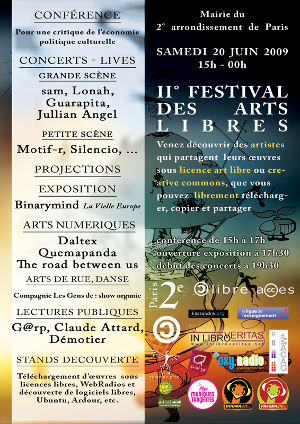Aidan Curran posted on June 21, 2009 19:00
Put French musicians around a dinner table or bar counter these times and the conversation will probably turn – in jest or in earnest – to le loi Hadopi, Hadopi’s Law. This is neither a French cop show, obscure rule of physics nor droll observation about how your tartine always falls to the carpet butter side down.
Hadopi is not a person but the acronym of the Haute Autorité pour la Diffusion des Oeuvres et la Protection des droits sur Internet, a proposed state body to regulate the traffic of copyrighted material on the Internet. And le loi Hadopi is a government-sponsored bill that seeks to create the Hadopi and punish the act of downloading or sharing copyrighted files illegally, i.e. without paying. Under a three-strikes system, an offender would receive two warnings before finally having their internet access cut off.
The bill has had a troubled life. Introduced by Nicolas Sarkozy’s centre-right government, it was first supported and then opposed by the deeply-divided opposition Socialist Party. But it soon became clear that France’s left-leaning mainstream music artists actually favoured the bill, although with some discomfort at being seen to support something sponsored by Sarko. Realising that they had seriously misjudged their own constituency, some Socialist deputies abstained an Assembly vote in April where the bill was defeated, and then from the May vote in which a re-jigged bill was passed. It was then sent to France’s Constitutional Council to check that it was legally sound.
But on 10 June the Council sensationally rejected the bill as unconstitutional. Giving a non-judicial body such as a state agency the power to cut off a person’s internet and personal communications access, the council decided, would breach two principles: presumption of innocence and liberty of expression. Now the bill will be redrafted and returned to a parliamentary vote.
 With impeccable timing, then, an association called Libre Accès held its annual Fête des Arts Libres (Free Arts Festival) in the town hall of the 2nd arrondissement of Paris last Saturday night. The day and night’s programme included discussion of the loi Hadopi and performances by acts who have chosen to make their work freely available on the Internet. Your correspondent was there to see a Paris band called Lonah, whose entire back catalogue of two albums and one E.P. is yours to download for free from their website. We recommend you check them out. (Obviously, if a band makes their music available for free then nobody’s going to have their internet snipped.)
With impeccable timing, then, an association called Libre Accès held its annual Fête des Arts Libres (Free Arts Festival) in the town hall of the 2nd arrondissement of Paris last Saturday night. The day and night’s programme included discussion of the loi Hadopi and performances by acts who have chosen to make their work freely available on the Internet. Your correspondent was there to see a Paris band called Lonah, whose entire back catalogue of two albums and one E.P. is yours to download for free from their website. We recommend you check them out. (Obviously, if a band makes their music available for free then nobody’s going to have their internet snipped.)
What’s better than one good band? Two good bands! Also on the line-up were Franco-Venezuelan foursome Guarapita, whose sound is that of Latino revolutionaries gone ska. The crowd liked them a lot - even more when they started serving vodka and orange out of a plastic bucket. Free music and free booze: life is good.
Regardless of how the mainstream artistic world feels, the trend for celebrating ‘free’ music is spreading. The Fête de la Culture Etudiante (Student Culture festival) will take place on 27 June at the Bellevilloise in Paris. There’s no entry charge, and the festival’s slogan is ‘Libres comme les arts’: free as the arts. (Though we must admit we'd be willing to pay to hear a band from Angers called Misty Socks play their fine new single 'Not A Wanker', pronounced "wonker" à la française. We've made up none of that.)
Meanwhile, le loi Hadopi lies waiting to re-appear in some new form, as intriguing a drama as any U.S. series you could download without paying. Perhaps it’s closer to a French cop show after all.
Here's the atmospheric electro-rock of Lonah's 'Les Effacés':
More ...
[Read More...]